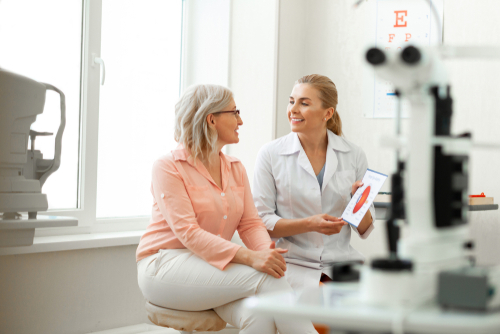Posted by: Associates in Ophthalmology (NJ) in Eye Health
Eye exams are an important part of keeping your vision protected. They enable your doctor to detect diseases early on, correct existing vision problems, monitor chronic conditions, and get insight into your overall eye health.
While examining and testing your vision is a big part of a routine eye exam, so is communication. It is an excellent time to ask your ophthalmologist questions or raise concerns.
Keep reading to learn five questions to bring with you to your next eye exam!
Have There Been Any Changes Since My Last Exam?
Eye exams are about more than just what your vision is currently like. Your eye doctor will also have your vision track record.
Vision changes can indicate disease or underlying conditions. These changes can be so subtle you may not even realize they have happened.
Do I Have Any Concerning Symptoms?
Eye conditions can have a variety of symptoms that often overlap. You and your eye doctor must be aware of these so you can begin the right treatment if necessary.
If you experience any of these symptoms, report them to your eye doctor:
- Blurred vision
- Double vision
- Eye Pain
- Light sensitivity
- Redness of the eyes
- Dryness and itchiness
- Swelling around the eyelids
- Loss of peripheral vision
Do I Need Glasses?
Glasses are a common way to treat refractive errors. Refractive errors are nearsightedness, farsightedness, and astigmatism.
They affect the way light enters your eyes, causing vision to come into focus incorrectly. Glasses correct this by bending the light to land directly on the retina instead of in front or behind, compensating for the error.
Even if you already have glasses, your prescription may change over time. Updating your prescription will help you continue to see clearly and comfortably.
Should I Consider Contact Lenses or LASIK?
Contacts are a great substitute for glasses if you do not want frames on your face. They are essentially invisible and fit directly onto your eyes.
Contacts are more complicated to take care of than glasses, however.
They need to be replaced regularly and must be taken out and rehydrated every night. LASIK is a surgical solution.
It is very effective and can produce outstanding results. In the long term, it can even save you money when compared to contacts.
If you are interested in permanently restoring your vision, ask your eye doctor about LASIK or another corrective eye surgery.
How Do I Keep My Vision Safe?
An eye exam is an excellent opportunity to learn. You get some one on one time with a professional who can give you expert advice.
There are plenty of things you can do on your own to help maintain good eye health. For example, eat healthy foods with plenty of vitamins.
Leafy greens like kale and spinach are particularly good for your vision, as well as foods with omega-3 fatty acids. It’s also important to control your blood sugar.
Diabetes can have a direct impact on your eyesight. Talk with your doctor about strategies to keep your blood sugar levels in check. Don’t forget to wear protective eyewear when needed.
Safety goggles are important during construction projects or when working with corrosive chemicals. UV-protected sunglasses will shield your eyes from harmful sun rays wherever you go outside.
At your next eye exam in Livingston, NJ, with Associates in Ophthalmology, bring your questions and get some answers!
Do you have more questions, or are you ready to get some answers? Schedule an appointment at Associates in Ophthalmology in Livingston, NJ, today!


